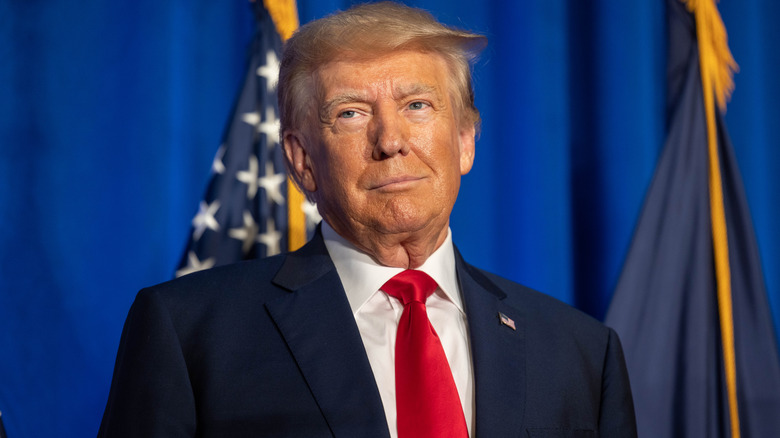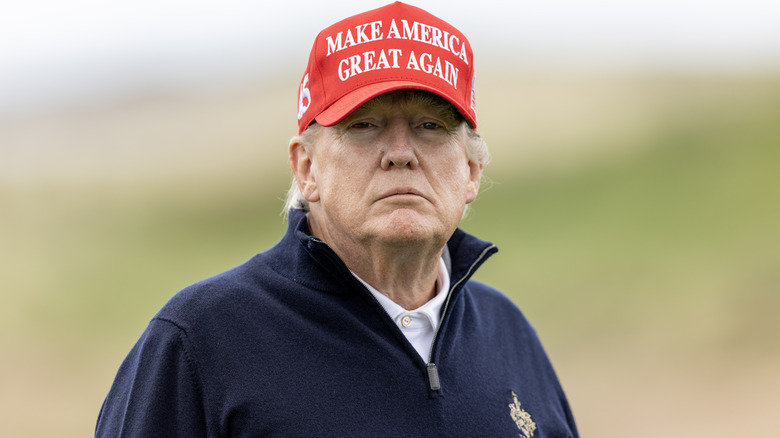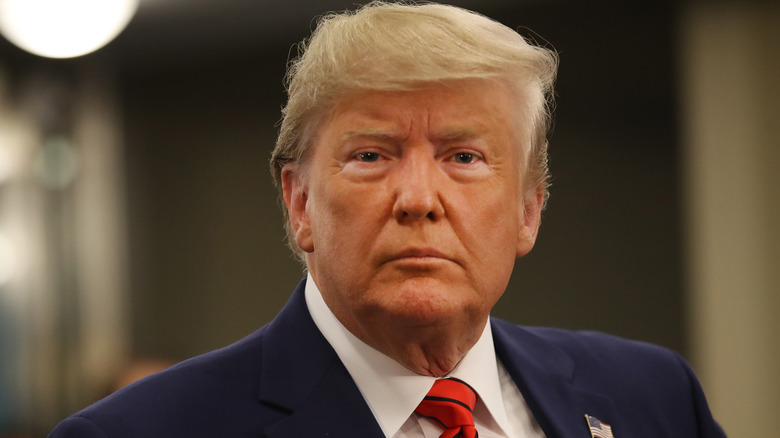The Truth About Donald Trump's Relationship With Don Hankey
Donald Trump has a previous connection to Don Hankey, the billionaire who backed the $175 million bond tied to his New York civil fraud case.
In case you missed it, Trump's lawyers announced in court that the one-term president was unable to pay the $454 million judgment imposed by Judge Arthur Engoron in February 2024. However, Trump received a major break when a team of appellate division judges reduced his bond to $175 million on March 25. "We are extremely pleased with the ruling issued by the Appellate Division. This monumental holding reigns in Judge Engoron's verdict, which is an affront to all Americans," Trump's head attorney, Alina Habba, said in a statement obtained by NBC News. This bond offers Trump a financial lifeline, enabling him to retain his personal assets as he fights to appeal against Judge Engoron's ruling.
On April 1, Trump posted the $175 million bond — this will ensure that the court is paid its judgment should Trump's appeal efforts fall short. The man responsible for Trump's temporary legal victory is Don Hankey, the chairman of Knight Specialty Insurance, which according to its website, "is a provider of capital support and underwriting capability for niche property and casualty insurance programs." Speaking on Trump's bond, Hankey said, "This is what we do at Knight Insurance, and we're happy to do this for anyone who needs a bond." And though Hankey revealed that he doesn't know Trump personally, they actually share an important connection.
Don Hankey is a Trump supporter
Don Hankey, whom Forbes estimates has a fortune valued at $7.4 billion, reached out to Donald Trump when he heard that the former president needed help finding a company to underwrite a bond for his civil fraud trial judgment. While speaking with CNN, Hankey asserted that his company would have extended the same deal to anyone. "It's what we do," he explained. "I'm happy to do it. ... It was an easy transaction. It was put together very quickly." Hankey also confirmed Trump's previous assertion that he'd be paying the hefty bond with cash. "Ultimately, he put up all cash," said Hankey, even though the president initially toyed with the idea of leveraging investment-grade bonds.
Hankey angled his decision to intervene as a business move. "This is what we do at Knight Insurance, and we're happy to be able to accommodate the ex-president in this situation," Hankey told ABC News. However, he also has a political interest in the presidential hopeful. "I'd say it's more of a business decision, but I happen to be a supporter also," explained Hankey, who has previously donated to Trump's campaign.
Trump previously sought a $100 million loan from Axos Bank — where Hankey is a shareholder — to refinance the mortgage on Trump Tower. Axos Bank also loaned Trump $225 million as he weathered the professional fallout from the January 6 Insurrection.
Letitia James challenged Don Hankey's bond
Don Hankey's intervention postponed New York Attorney General Letitia James' ability to collect Donald Trump's personal assets as he appeals his judgment. However, Trump isn't exactly in the clear yet. According to CNN, James challenged whether Hankey's company, Knight Specialty Insurance, which is not based in New York, is legally able to underwrite Trump's bond. In an effort to verify Hankey's company's finances, James filed a "notice of exception to the sufficiency of the surety," which has resulted in an April 22 hearing with Judge Arthur Engoron. Furthermore, if Trump and his legal team fail to respond to James' inquiry, the bond could end up being null and void.
Newsweek spoke with a source from James' office, who explained that Hankey's out-of-state company wasn't eligible to receive a certificate of qualification from the Department of Financial Services. "If you seek a bond from a company not admitted in New York, as Trump did with Knight, you cannot get a certificate of qualification from DFS," shared the insider. "So, by law, you have to demonstrate to the court why the surety you obtained is capable of paying under the bond if the judgment creditor files a notice of exception to the surety, as we did here." They continued. "At a minimum, that requires a showing that the surety is financially sound and that the face amount of the bond is sufficiently collateralized by identifiable assets."



